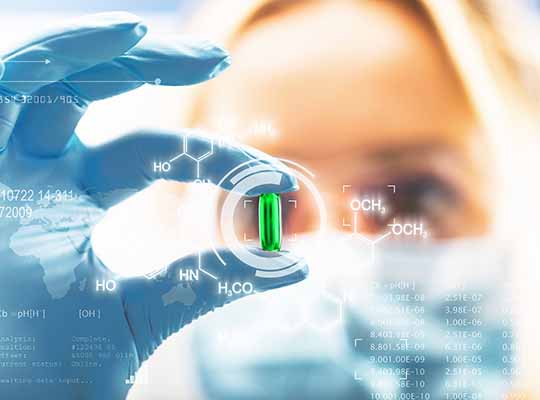Quick drug identification for COVID-19 could serve as a boon, as many countries struggle to contain the deadly virus. Lockdowns and stringent restrictions on the movement of people have had a negative impact, including tremendous losses incurred by companies in the AI in drug discovery market. However, if proper treatment is found for treating COVID-19 patients, it could help in many ways. A University of Michigan research team has used an AI-powered image to identify over 17 existing drugs to reduce coronavirus infection in cells. Such methods and techniques help discover the efficacy of existing drugs against COVID-19, ultimately contributing to the growth of the AI in drug discovery market.
Rise in Incidence of Chronic Diseases Propels Need for AI in Drug Discovery
The incidence of chronic diseases is increasing at a rapid pace across the globe. According to the Centers for Disease Control and Prevention (CDC), six in 10 adults in the U.S. have a chronic disease, and four in 10 adults have two or more. Furthermore, the CDC also highlights that chronic diseases such as heart disease and diabetes are the leading causes of death in the U.S. Such statistics shed light on the growing prevalence of chronic diseases and the need to bring down the fatality rate caused due to these diseases.
AI platforms used for drug discovery can prove to be a feasible option for deriving insights into the discovery of drugs to treat and minimize the severity of various chronic diseases. Thus, these factors will led to considerable growth of the AI in drug discovery market during the forecast period of 2021–2031.
Profound Impact of Oncology on Market Growth
The role of AI in oncology is estimated to offer significant growth opportunities. AI can help the researchers understand how cancer cells become resistant to anticancer drugs, eventually leading to drug development and adjust drug use. AI technologies such as machine learning can act as a catalyst in existing anticancer drug research.
Paige’s, an AI diagnostic technology startup is a classic instance of the rising advancements in the oncology segment. The company uses machine learning to enable pathologists to facilitate precise cancer diagnoses through the images of tissue samples. Such developments are expected to fuel the growth of the AI in drug discovery market.
Popularity of Mindful AI to Offer Breakthrough Opportunities
Mindful AI is a fast emerging ideal solution for developing drugs in a more human-centric and responsible manner. Mindful AI is an intention-based approach used for creating effective AI-based technologies. With mindful AI, pharmaceutical companies can not only know about how quickly a drug can be developed but also about how inclusive it is in terms of effectiveness. Thus, the growing popularity of mindful AI in the pharmaceutical industry will present promising growth opportunities, thus driving the overall AI in drug discovery market.
Advancements in Treatment of Neurological Diseases to Open Profitable Avenues
The use of AI in treating neurological disorders could present an array of growth opportunities. Various players in the pharmaceutical industry are collaborating for exploring novel neurological diseases solutions. PharmEnable, the U.K.-based drug discovery company and Sosei, a Japan-based firm, are collaborating to use the Sosei Heprares CPCR-focused drug design platform and PharmEnable’s AI technologies to discover drug leads. Similar developments will assure extensive growth for the AI in drug discovery market.
Stuck in a neck-to-neck competition with other brands? Request a custom report on AI in Drug Discovery Market
Analysts’ viewpoint
The AI in drug discovery market is estimated to expand at a CAGR of 36.1% during the forecast period of 2021-2031. The global market is projected to cross US$ 10.93 Bn by 2031. The cases of chronic diseases, especially cardiovascular disorders and diabetes, are increasing at an accelerated rate, eventually boosting the need for AI in drug discovery platforms. Furthermore, the use of AI in treating neurological disorders will help in increasing the growth rate. Players in the AI in drug discovery market should focus on using Mindful AI to design and develop effective drug discovery platforms. Furthermore, advancements made by AI in findings related to COVID-19 are anticipated to witness substantial growth.
AI in Drug Discovery Market: Overview
- Artificial intelligence (AI) has caught the attention and minds of medical technology practitioners in the past few years, as several companies and major research laboratories have worked to perfect these technologies for clinical use. The first commercialized demonstrations of how AI (also known as deep learning, machine learning, or artificial neural networks) could assist clinicians are now available. These systems could lead to a paradigm shift in clinician workflow, increase productivity while simultaneously enhancing treatment and patient throughput.
- Artificial intelligence in healthcare is booming, and with the limitless possibilities offered by this cutting-edge technology, a slew of business behemoths are investing in healthcare applications. Integration of AI and machine learning tools in drug discovery & development applications could enhance healthcare outcomes by increasing drug discovery efficiency, facilitating targeted molecule identification, minimizing drug discovery timeframes, and, most importantly, lowering drug development costs for drug manufacturers.
- Moreover, various pharmaceutical firms and entrepreneurs across the world are launching projects and investing in the creation of AI and machine learning technologies for bettering drug discovery and improving drug development outcomes
AI in Drug Discovery: Market Drivers
- Increase in cross-industry alliances and collaborations drives the global AI for drug discovery market. Rise in relevance of AI in drug discovery & development and surge in funding for R&D activities, including AI technology in the field of drug research, are projected to propel the global market.
- In July 2020, IBM acquired WDG Automation to advance AI-Infused Automation Capabilities for Enterprises. This acquisition advances IBM’s comprehensive AI-infused automation capabilities, spanning business processes to IT operations.
- Artificial intelligence (AI) drug discovery company Exscientia expanded its ongoing anti-viral drugs partnership with the U.K.’s national synchrotron facility Diamond Light Source and the University of Oxford across the Atlantic Ocean to include California-based Scripps Research’s Calibr and focus on COVID-19 research.
- In January 2021, Nucleai, the U.S.-based provider of biomarkers-based therapy, signed a collaboration agreement with Debiopharm Pharma Company, a pioneer in drug development. According to the terms of the agreement, Debiopharm Pharma Company will use Nucleai’s artificial intelligence (AI) platform for its pipeline oncology drug candidates.
- Hence, increase in cross-industry collaborations and partnerships drives the global AI in drug development market
Market Segmentation: AI in Drug Discovery Market
- In terms of drug type, the global AI in drug discovery market has been bifurcated into large molecules and small molecules
- Based on application, the global AI in drug discovery market has been classified into oncology, infectious diseases, neurological disorders, rare diseases, metabolic diseases, cardiovascular diseases, and others
- In terms of end user, the global AI in drug discovery market has been divided into pharmaceutical & biotechnology companies, contract research organizations, academics & research, and others
- Based on offering, the global AI in drug discovery market has been split into software and services
- In terms of technology, the global AI in drug discovery market has been segregated into machine learning and other technologies
- Each of the segments has been analyzed in detail for market trends, recent trends, and developments, drivers, restraints, opportunities, and useful insights. The AI in drug discovery market report provides current and expected revenue (US$ Mn) for each of these segments from 2021 to 2031, considering 2020 as the base year. The compound annual growth rate (percentage CAGR) has been provided for each segment and market from 2021 to 2031 along with market size estimations.
Regional Overview: AI in Drug Discovery Market
- In terms of region, the global AI in drug discovery market has been segmented into North America, Europe, Asia Pacific, Latin America, and Middle East & Africa. The regions have been divided into major countries and sub-regions.
- North America is projected to account for the largest share of the global AI for drug discovery market in the near future, as the region is technologically advanced and one of the early adopters of latest technologies. High awareness about AI in drug discovery among the key players in the region is another driver of the global AI for drug discovery market.
- The current and expected market revenue (US$ Mn) of these regional markets and their major countries have been provided in the report from 2021 to 2031, with their CAGRs from 2021 to 2031
- The study also offers a list of recommendations, highlights, and useful insights of the global AI in drug discovery market, which would help new companies willing to enter the market and existing companies to increase market shares and in the decision-making process
Major Players
- The AI in drug discovery market report concludes with the company profiles section, which includes key information about major players in the global AI in drug discovery market
- Leading players analyzed in the report include
- Exscientia
- GNS Healthcare
- Cloud Pharmaceuticals, Inc.
- Benevolent AI
- PathAI, Inc.
- Berg Health
- Atomwise
- Insitro
- Cyclica
- BlackThorn Therapeutics
- Insilico Medicine
- Notable Labs
- Standigm
- Recursion Pharmaceuticals
- BioSymetrics
- Each of these players has been profiled in the AI in drug discovery market report based on parameters such as company overview, financial overview, business strategies, application portfolio, business segments, and recent developments



















